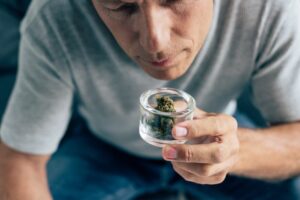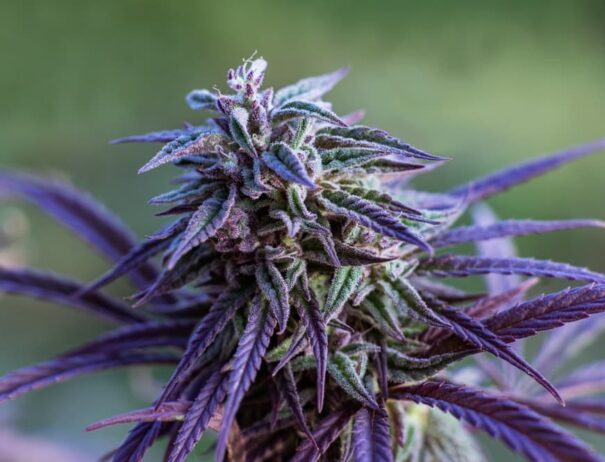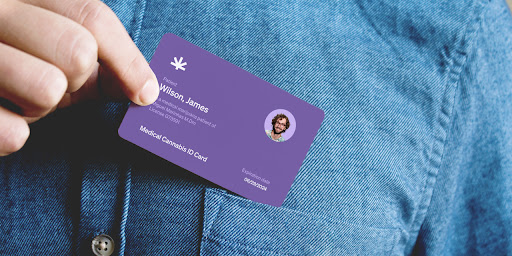Does Weed Help with Depression?

In recent years, cannabinoids have been garnering a reputation for being able to help with a variety of health issues, including depression. What does the evidence say about weed’s effectiveness against depression? And what should you be aware of when treating mood disorders with marijuana? We’re here to answer those burning questions.
Defining Depression
Depression describes a variety of psychological disorders associated with a persistently low mood. Symptoms of depression may include:
- Hopelessness
- Decreased energy levels
- Irregular sleep patterns
- Over- or under-eating
- The inability to experience excitement or joy
The most common forms of depression are:
- Bipolar disorder
- Seasonal affective disorder (SAD)
- Major depressive disorder
- Persistent depressive disorder
- Postpartum depression
These disorders can have damaging effects on a person’s psychological and physical health as well as overall well-being.
Causes of Depression

While some instances of depression may have an obvious trigger, such as the loss of a loved one or a traumatic event, the causes of other depressive episodes are not as easy to pinpoint. Scientists and mental health professionals recognize that a variety of factors may lead a person to experience depression, including:
- Life circumstances
- Environmental factors
- Genetic predisposition
- Brain inflammation
Treating depression effectively depends on understanding the dynamics of how these factors interrelate.
Traditional Treatments for Depression
Among the many ways people seek relief from their depressive symptoms are:
- Talk therapies, such as CBT (cognitive behavioral therapy) or psychotherapy
- Physical exercise, such as walking, running, or yoga
- Mental exercise, such as meditation or mindfulness
- Prescription drugs, such as SSRIs (selective serotonin reuptake inhibitors) and SNRIs (serotonin and noradrenaline reuptake inhibitors)
However, these interventions and medications do not work equally well for all people who live with depression. Depressed individuals can have a difficult time motivating themselves to undertake physical activities or other behavioral changes. Talk therapies might not be as useful for those whose depression stems from a chemical imbalance. And prescription drugs carry the potential for unpleasant side effects, such as:
- Digestive issues
- Dizziness
- Dry mouth
- Excessive sweating
- Sensitivity to heat
- Headaches
- Sleep disturbances
- Reduced libido
- Difficulty achieving orgasm
- Erectile dysfunction
Depression and Cannabinoids

Cannabinoids interact with the mind and body largely through a person’s endocannabinoid system (ECS). This network sends and receives neurochemical signals throughout the body, balancing functions such as:
- Sleep
- Memory
- Appetite
- Mood
A properly functioning ECS is crucial for a person’s mental health, and imbalances in the system may correlate to depression.
Recent evidence has suggested that the chemicals found within the cannabis plant have the potential to act as effective antidepressants. This may come as no surprise since many people enjoy weed for its ability to:
- Elevate their mood
- Alter their perceptions of life
- Induce euphoria
- Increase sociability
Furthermore, many people use marijuana to alleviate their pain. Since long-term physical discomfort has strong associations with depressive states, it may be correlated that using weed to treat pain can also have a positive effect on a person’s mood or outlook.
Some folks wonder whether cannabis can cause depression. However, research into the association between weed and depressive states points to the probability that depression makes people more likely to use cannabis due to the medicinal effects, rather than the other way around.
Factors Affecting Weed’s Relationship with Depression
While scientists are still answering many important questions about cannabinoids and depression, the relationship is far from simplified. Many factors influence weed’s effects on depressed individuals.
Dosing
Even if you use marijuana recreationally, you know that the amount you consume will transform your experience entirely. For example, while many people feel relaxed after a single puff, they might feel highly paranoid after smoking an entire joint.

Similarly, evidence suggests that people who consume high levels of THC might find that their mood worsens. Lower THC levels, on the other hand, might be more uplifting. The precise effects of any dose of cannabinoids on your mood will be influenced by your constitution, tolerance levels, and other factors.
There are a few different tools you can turn to when looking to find the right dose for you. To start, you can use Cannabutter Digest’s edible dosage calculator to help you determine the potency of your edible. Additionally, tCheck is a useful edible-making accessory that can help identify the potency of your cannabis infusion. Visit our blog post reviewing tCheck and learn more about how it is helpful in the kitchen.
Cannabinoid Content
The effectiveness of cannabis on depression may also depend on the particular combination of cannabinoids a person consumes. One study offers evidence that cannabis products containing low levels of THC and high levels of CBD may be the most effective way to use cannabinoids to treat depression. This may be due to CBD’s ability to counteract any potential THC-induced anxiety.
Furthermore, many people find that using CBD alone is an effective way of treating their depressive symptoms.
Terpene Content
The ability of weed to help symptoms of depression is not only dependent on the presence of cannabinoids. The cannabis plant also contains other compounds known as terpenes. Scientists have found that some of these substances produce antidepressant effects in mice, and these results are promising for humans too.
Using Cannabis to Safely Help Your Depression
The right combination of various cannabis compounds might allow people to access an individualized way of managing their depression. However, the products available on the market are unlikely to contain the precise ratio you need to manage your symptoms safely.
Creating your own cannabis products at home is a wonderful way to always have a trustworthy supply of treatments that can work for you. Countertop infusion machines, such as the LĒVO II, LĒVO C, and LĒVO Lux, offer a streamlined way for you to make your own edibles, tinctures, and topical products.
If you are interested in making homemade edibles but don’t know where to begin, you can find a wide variety of recipes and tips on LĒVO’s website and right here on Cannabutter Digest.

Get Your Free eBook!
Download our FREE resource, The Ultimate Edibles Guidebook, full of recipes, infusion tips and everything you need to make your first batch of edibles today!



